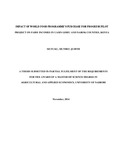| dc.description.abstract | The World
Food
Programme’s
Purchase for Progress
(WFP P4P)
Pilot project in Kenya has been
under implementation since 2009
. Some of the notable achievements
of the pilot proj
ect
include
improved access to credit, inputs and
group marketing
while the
main
challenges
were
contract
defaults and lack of storage facilities.
The P4P project was initiated by WFP in order
to procure
food mainly from
small scale farmers
with the aim of
enabling the
farmer groups to transit from
informal to structured trade through
the
sale of high quality food. The P4P project was
aimed at
increasing
smallholder
’s
agricultural productivity
(especially maize)
at
the
farm level and
improving
the livelihoo
d of farmers in terms of food security and
farm
income
.
The project has been in operation for three years
but
its
impacts are not well understood.
This
study
was therefore undertaken to
fill
this
gap in knowledge
. The study evaluated
the impact of
the Pur
chase for
Progress
(P4P)
project
on household incomes in Kenya.
The data were collected
from
250 farmers
(comprising of
113 participants and 137 non participants)
in
Uasin Gishu and
Narok counties
of Kenya
.
This study
employed the propensity score matching
(PSM) method
to
evaluate the impact of the P4P project on
the farmer’s income (maize gross margins were
used
a proxy for
farm incomes
)
.
The findings from this study indicated
that farmers’ decisions to participate in the P4P project
were significantly in
fluenced by gender of the household head, farm size, and price of maize
access to extension and
credit.
The
study also found
that the project participants
had
significantly
higher incomes
per acre per year than the non
-
P4P participants
sugges
ting that
the
P4P project had a positive impact on farmer’s incomes.
Therefore,
the
government, WFP and
other stakeholders
should come up with
interventions
that
encourage
improved
participation
levels
in P4P
such as improved access to credit, inputs and extension services
. | en_US |

